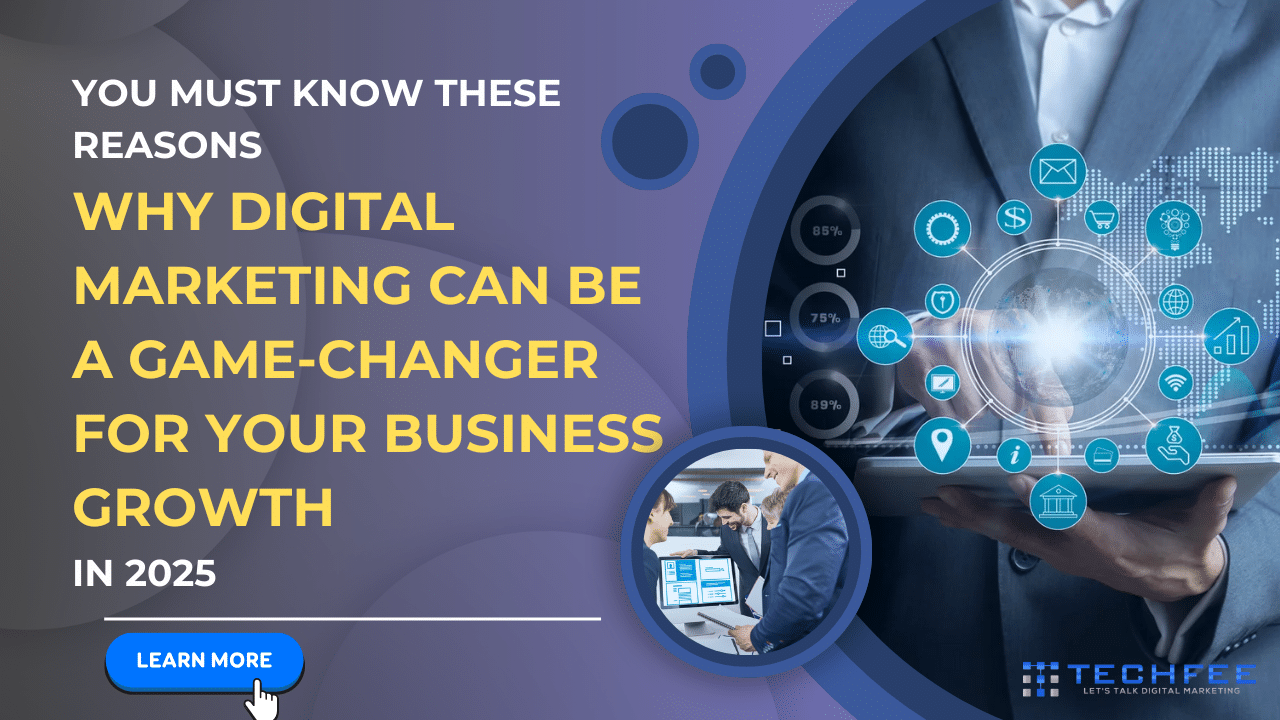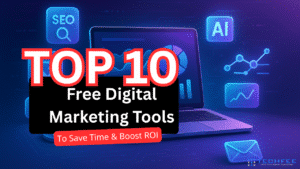Alright! So finally, you are here to Find out Why digital marketing is important for small businesses to reach customers, boost sales, and maximize your ROI in 2025.
In today’s fast-paced digital world, where consumers spend hours scrolling through social media, searching online, and engaging with brands digitally, one thing is clear: digital marketing is no longer optional—it’s essential, especially for small businesses.
Do you know that nearly all businesses in the U.S.—a staggering 99.9%—are classified as small businesses?
These ventures are undeniably the backbone of the American economy, driving innovation and growth.
However, running a small business isn’t easy.
You’re a one-person powerhouse, handling everything from building strategies and managing your website to keeping an eye on inventory. On top of that, you’re also the salesperson, the customer support team, and everything in between. The daily grind is a balancing act of endless tasks while trying to stay competitive and ahead of the game.
Amid this whirlwind, diving into digital marketing can feel overwhelming—just another item on your already packed to-do list.
In 2025, the significance of digital marketing has grown like never before, with 78% of consumers now researching products online before making a purchase and small businesses leveraging affordable, targeted campaigns to compete with big players.
According to Colorlib statistics, 58% of small businesses are already leveraging digital marketing, and most of them are gearing up to allocate even more of their budgets to it? Interestingly, 63% are channeling the majority of their spending into social media.
Here’s a fun insight: the six most popular digital marketing channels for small businesses include social media and websites, both at 73%, followed by email marketing at 57%, SEO at 49%, video at 34%, and content marketing at 32%. These platforms are shaping the way small businesses connect with their audience and grow their presence online.
If you’ve ever wondered how your small business can thrive in this competitive landscape, this blog post carries all the answers.
We’ll explore why digital marketing is the ultimate growth tool for small businesses, offering cost-effective ways to boost visibility, engage with customers, and drive sales.
By the end of this post, you’ll understand the powerful strategies that can help you attract more customers, grow your brand, and maximize your profits—all without breaking the bank.
Whether you’re just starting or looking to scale up your efforts, this guide will equip you with actionable insights to take your business to the next level.
Ready to unlock the secrets to digital marketing success?
Let’s dive in!
What is Digital Marketing, and Why Does It Matter?
Definition and Scope of Digital Marketing
Digital marketing promotes products or services using online platforms such as websites, social media, email, search engines, and other digital channels.
It allows businesses to reach their target audience directly and interact with them in real-time, making it more dynamic and effective than traditional marketing methods.
From building brand awareness and generating leads to nurturing customer relationships, digital marketing covers a wide range of strategies that can be tailored to suit any business size or industry.
How Digital Marketing Differs from Traditional Marketing
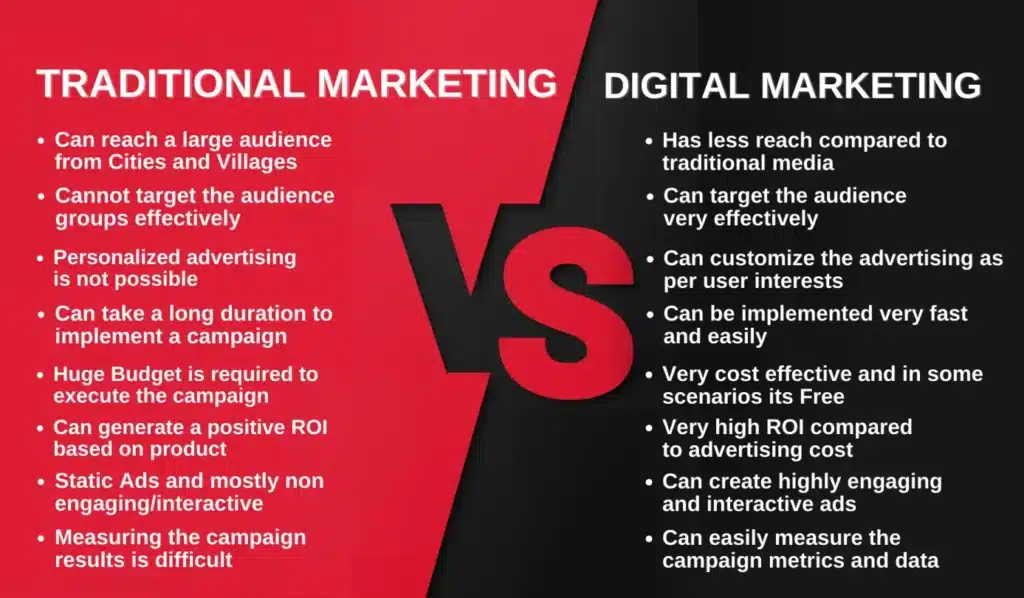
Unlike traditional marketing, which relies on physical mediums like TV commercials, newspaper ads, and billboards to reach a broad audience, digital marketing allows businesses to target specific groups precisely.
For example, a traditional ad in a magazine may reach thousands of people, but it won’t guarantee they’re your ideal customers.
In contrast, digital marketing platforms like Facebook or Google Ads enable small businesses to target users based on demographics, interests, and behavior.
Moreover, digital marketing provides measurable results, allowing businesses to track performance, optimize campaigns, and achieve better ROI—something traditional marketing often lacks.
Why Small Businesses Need Digital Marketing in 2025
In 2025, digital marketing is not just a smart option for small businesses; it’s a necessity.
With more people relying on the internet to discover, research, and purchase products or services, businesses without a digital presence risk being left behind.
Digital marketing levels the playing field by offering small businesses cost-effective tools to compete with larger companies.
Whether it’s reaching a local audience through SEO or connecting with global customers via social media, digital marketing empowers small businesses to grow their visibility, drive engagement, and boost sales in ways that traditional marketing cannot.
For small businesses looking to thrive in an increasingly online world, digital marketing is the ultimate game-changer.
The Core Benefits of Digital Marketing for Small Businesses
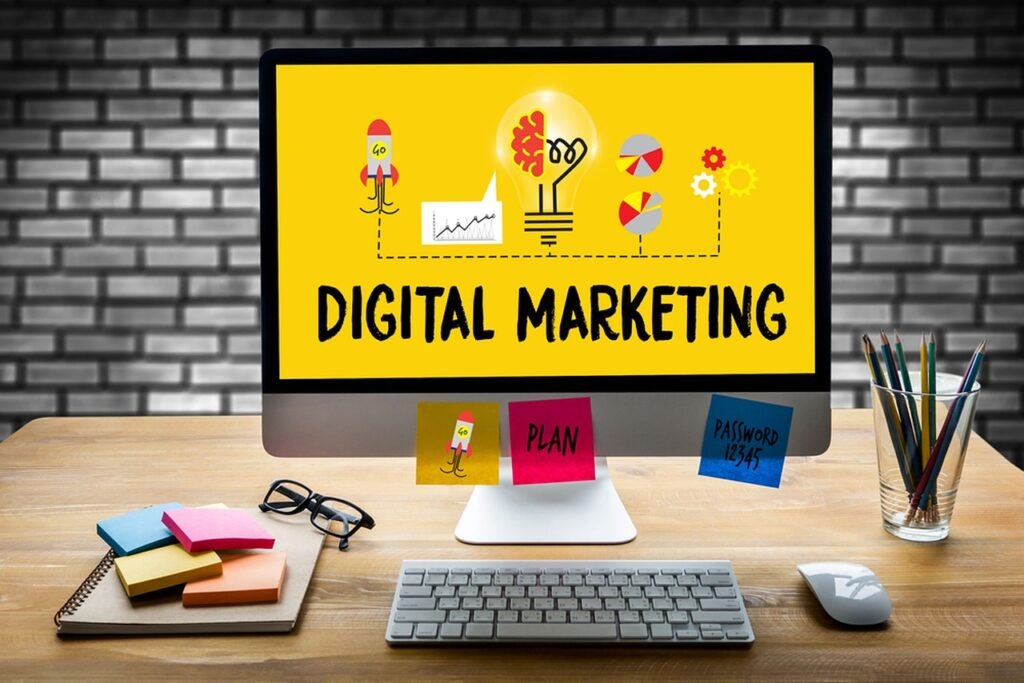
1. Cost-Effective Marketing for Tight Budgets
Digital marketing is a lifesaver for small businesses with limited budgets.
Unlike traditional advertising methods such as TV or print ads, which often require significant investment, digital channels like social media, email marketing, and search engine optimization (SEO) are affordable and deliver impressive returns.
Even a modest budget can yield measurable results, making it an ideal choice for small businesses looking to maximize their marketing spend.
2. Wider Audience Reach Locally and Globally
Digital marketing breaks geographical barriers, allowing small businesses to connect with audiences both locally and globally.
With tools like Google Ads and social media platforms, businesses can reach customers in their neighborhoods or halfway across the world.
This expanded visibility opens up opportunities for growth that were once only available to large corporations.
3. Boosts Brand Awareness and Credibility
By creating a strong online presence, small businesses can establish themselves as trusted and credible brands.
Consistent posting on social media, engaging content on websites, and positive customer reviews all contribute to building trust with the audience.
Over time, these efforts help small businesses stand out in a competitive market.
4. Targeted Marketing for Better Results
One of the most powerful aspects of digital marketing is its ability to target specific audiences.
Platforms like Facebook and Google allow businesses to tailor their campaigns based on demographics, interests, behaviors, and even purchasing intent.
This ensures marketing messages reach the right people at the right time, resulting in higher conversion rates and better ROI.
5. Data-Driven Decisions and Measurable Results
With digital marketing, small businesses can make data-driven decisions thanks to analytics and tracking tools.
Metrics like website traffic, click-through rates, and conversion rates provide valuable insights into what’s working and what needs improvement.
This ability to measure and optimize ensures businesses can continuously improve their strategies for better outcomes.
6. Increased Customer Engagement
Digital marketing fosters direct interaction with customers through social media, email, and other channels.
Responding to comments, answering queries, or sending personalized offers not only improves customer satisfaction but also builds strong relationships.
This engagement creates loyal customers who are more likely to support the business in the long run.
7. Enhanced Flexibility and Scalability
Digital marketing grows with the business. Whether a small business is just starting out or looking to scale up, digital strategies can adapt to meet changing needs.
From running local campaigns to launching global promotions, the flexibility of digital marketing ensures businesses can align their efforts with their growth goals.
In summary, digital marketing offers unparalleled benefits that help small businesses thrive in today’s competitive market.
Its cost-effectiveness, reach, and ability to deliver measurable results make it an indispensable tool for any small business looking to grow and succeed.
Key Digital Marketing Strategies Small Businesses Should Use
Search Engine Optimization (SEO)
SEO is the backbone of any digital marketing strategy.
By optimizing their websites with relevant keywords, quality content, and user-friendly designs, small businesses can rank higher on search engine results pages (SERPs).
This visibility helps attract organic traffic, making it easier for potential customers to discover their products or services without costly advertising efforts.
Social Media Marketing (SMM)
Platforms like Instagram, Facebook, and LinkedIn are goldmines for small businesses to connect with their audience.
By creating engaging posts, running targeted ads, and interacting with followers, businesses can build brand awareness and foster relationships with potential customers.
Each platform offers unique opportunities, such as showcasing products on Instagram or networking with professionals on LinkedIn.
Content Marketing
Content is king, and for small businesses, blogs, videos, and infographics are powerful tools to attract and educate their audience.
High-quality content not only drives traffic but also establishes authority and trust.
For instance, an informative blog or an engaging infographic can solve customer problems while subtly promoting products or services.
Email Marketing
Email marketing remains one of the most effective ways to build and maintain customer relationships.
Sending personalized emails, exclusive offers, or updates keeps customers engaged and encourages repeat business.
It’s a cost-effective strategy to nurture leads and turn them into loyal customers.
Pay-Per-Click (PPC) Advertising
Like Google Ads, PPC advertising allows small businesses to quickly reach highly targeted audiences.
With a pay-only-for-clicks model, businesses can manage their budget efficiently while ensuring their ads appear to users searching for related products or services.
It’s an excellent way to generate immediate traffic and leads.
Video Marketing
The popularity of video content has skyrocketed, making it an essential strategy for small businesses.
From product demos to storytelling, videos engage audiences more effectively than text or images.
Platforms like YouTube and TikTok offer small businesses the chance to connect creatively with their audience and drive more engagement.
Get Your Free Ebook: Master Video Marketing for Your Business Growth!
Learn actionable strategies to grow your small business online and boost your sales this year.
We respect your privacy. No spam, ever. Your email will only be used to send you the ebook, marketing stuff, and related updates.
Mobile Marketing
With the rise of smartphones, mobile marketing is a must.
Strategies like SMS marketing and creating mobile-friendly websites ensure that businesses can reach customers on the go.
A responsive, easy-to-navigate website improves the user experience, while SMS campaigns can deliver timely offers directly to customers’ phones.
By combining these strategies, small businesses can create a comprehensive digital marketing approach that drives visibility, builds trust, and ultimately grows their customer base.
Actionable Tips for Small Businesses to Start Digital Marketing
Conduct Competitor and Market Research
Before diving into digital marketing, it’s crucial to study your competitors and understand your target market.
Analyze what strategies successful competitors are using, identify gaps in their approach, and find ways to offer something better or unique.
This research will help you create a more informed and competitive digital marketing strategy.
Create a Strong Online Presence
Building a strong online presence is the foundation of digital marketing.
Start with a professional website that’s mobile-friendly and easy to navigate.
Set up social media accounts on platforms where your audience is most active, and claim your business on local directories like Google My Business to enhance visibility and credibility in local searches.
Use Free or Affordable Tools for Digital Marketing
Small businesses can save time and money by leveraging free or affordable tools to manage their marketing efforts.
Tools like Google Analytics provide valuable insights into website traffic, Canva helps create professional-quality graphics, and Mailchimp makes email marketing easy and effective.
These tools enable small businesses to execute powerful strategies without breaking the bank.
Focus on Building Customer Loyalty Through Personalized Marketing
Customer loyalty is key to sustainable growth.
Use personalized marketing techniques, such as addressing customers by name in emails or offering tailored recommendations based on their past purchases.
These small, thoughtful touches can make customers feel valued and encourage repeat business.
Leverage User-Generated Content and Customer Reviews
User-generated content (UGC) and customer reviews can significantly boost your brand’s credibility.
Encourage happy customers to share their experiences through testimonials, photos, or videos, and showcase these on your website and social media.
Positive reviews not only build trust but also influence potential buyers, driving more conversions.
By implementing these actionable tips, small businesses can kickstart their digital marketing journey, connect with their audience effectively, and achieve long-term success in a cost-efficient way.
Real-Life Examples of Small Businesses Excelling in Digital Marketing
Case Study 1: A Local Bakery Boosting Sales with Social Media Ads
A small, family-owned bakery used targeted social media ads on Instagram and Facebook to promote their seasonal specials and discounts.
By targeting local audiences within a 10-mile radius, they managed to attract more foot traffic to their store and saw a 30% increase in weekend sales.
Engaging visuals of their fresh pastries and user-generated content from happy customers helped build trust and fostered a sense of community among local followers.
Case Study 2: A Boutique Using Email Marketing for Repeat Customers
A boutique specializing in handmade jewelry leveraged email marketing to maintain customer relationships and drive repeat business.
By sending personalized emails with product recommendations, exclusive discounts, and sneak peeks of new collections, the boutique kept its customers engaged.
Over time, they saw a 25% increase in repeat purchases and a stronger sense of loyalty among their customers.
Case Study 3: An Eco-Friendly Brand Leveraging SEO to Attract Global Buyers
An eco-friendly skincare brand used SEO strategies to expand their reach globally.
They optimized their website with relevant keywords like “sustainable skincare” and “organic beauty products,” published educational blog posts, and created product pages with detailed descriptions.
As a result, their organic website traffic increased by 50%, and they began receiving orders from international markets, all without spending heavily on advertising.
These examples highlight how small businesses can use digital marketing creatively and strategically to achieve remarkable results, regardless of their size or industry.
Challenges Small Businesses Face in Digital Marketing
Limited Budgets and Resources
One of the biggest challenges small businesses face is working with limited budgets and resources.
Unlike larger companies with expansive marketing teams and funds, small businesses often have to manage marketing efforts with minimal staff and financial constraints.
This can make it difficult to compete and scale their campaigns effectively.
Keeping Up with Changing Digital Trends
The digital marketing landscape evolves rapidly, with new tools, algorithms, and platforms emerging regularly.
For small businesses, staying updated and adapting to these changes can be overwhelming, especially without dedicated marketing expertise.
Falling behind in trends can lead to missed opportunities and reduced effectiveness of their strategies.
Balancing Online and Offline Marketing Efforts
Small businesses often struggle to strike a balance between digital and traditional marketing.
While digital marketing offers vast opportunities, many businesses still rely on offline strategies to connect with their local community.
Managing both simultaneously can stretch their already limited resources and lead to inconsistent results.
Solutions: Outsourcing, Using Cost-Effective Tools, and Prioritizing Platforms
To overcome these challenges, small businesses can outsource tasks to marketing professionals or agencies, ensuring expertise without the need to hire full-time staff.
Additionally, leveraging cost-effective tools like Google Analytics, Canva, and Mailchimp can help streamline efforts and maximize results.
Finally, prioritizing the platforms that align most closely with their target audience allows businesses to focus their energy and resources on what delivers the highest ROI.
By addressing these challenges strategically, small businesses can make the most of their digital marketing efforts and compete effectively in the online space.
Why Digital Marketing is Important for Small Businesses in 2025
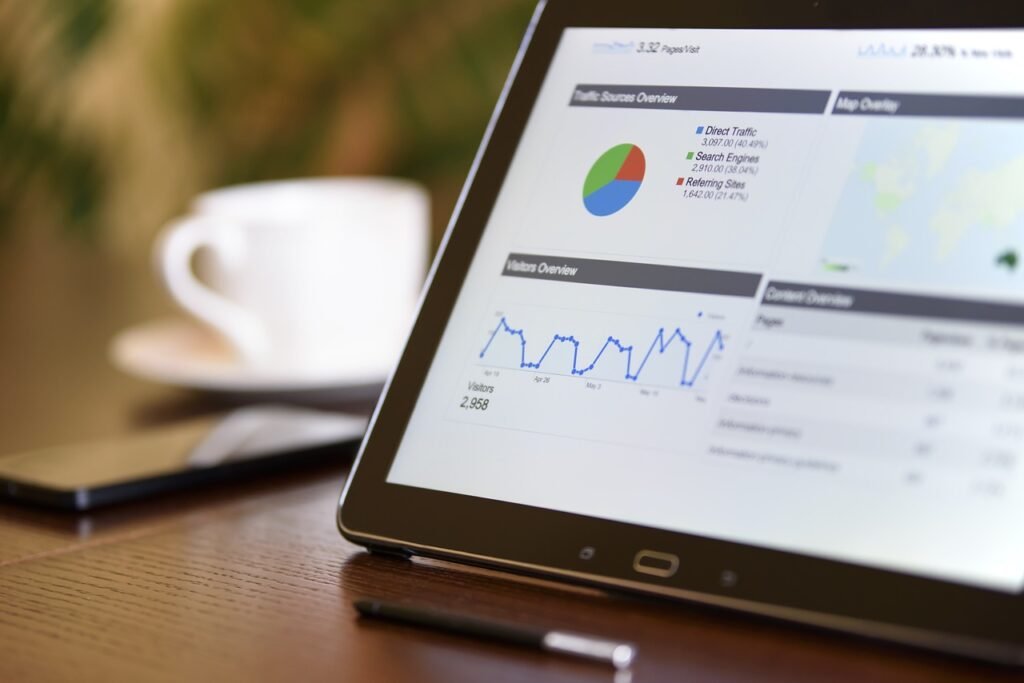
The Competitive Edge It Provides
In 2025, digital marketing has become the ultimate equalizer for small businesses.
It allows them to compete with larger corporations by leveraging cost-effective strategies to reach their target audience.
With tools like social media ads and SEO, small businesses can position themselves prominently in the market, attract potential customers, and build brand recognition, all without requiring a massive marketing budget.
Meeting Customer Expectations in a Digital-First World
Today’s customers expect businesses to have a strong online presence.
Whether it’s researching products, reading reviews, or interacting with brands on social media, the buyer’s journey now starts online.
Small businesses that embrace digital marketing can meet these expectations by being visible where their customers are, providing valuable content, and offering seamless online experiences that enhance trust and engagement.
Staying Ahead of Trends and Adapting to New Technologies

As technologies like artificial intelligence (AI) and automation reshape the digital marketing landscape, small businesses must stay ahead of the curve to remain competitive.
AI-powered tools enable smarter ad targeting, personalized customer interactions, and data-driven insights, while automation streamlines repetitive tasks like email campaigns.
By adopting these advancements, small businesses can operate more efficiently and connect with customers in innovative ways, ensuring they thrive in a tech-driven era.
In 2025, digital marketing isn’t just a strategy—it’s a necessity for small businesses looking to grow, adapt, and succeed in a world dominated by digital interactions.
How to Start Your Digital Marketing Strategy Today
Step-by-Step Guide to Creating an Actionable Digital Marketing Plan
Starting your digital marketing journey begins with a clear, actionable plan.
Begin by identifying your target audience and understanding their needs and behaviors.
Next, select the right digital channels—whether it’s social media, email, or search engines—that align with your business goals.
Develop a content calendar to organize your efforts and ensure consistency.
Finally, allocate your budget wisely, focusing on strategies that provide the best return on investment (ROI), such as SEO or targeted social media ads.
Setting Realistic Goals for Growth and ROI
To make your digital marketing strategy effective, set realistic and measurable goals.
Whether it’s increasing website traffic by 20% in three months or generating 50 new leads through email campaigns, your goals should be specific, achievable, and time-bound.
Align these goals with your overall business objectives to ensure that every marketing effort contributes to growth and profitability.
Importance of Monitoring and Tweaking Strategies Over Time
Digital marketing is not a one-and-done process.
Regularly monitor the performance of your campaigns using tools like Google Analytics or social media insights to track key metrics such as traffic, engagement, and conversions.
Use this data to identify what’s working and where improvements are needed.
By tweaking your strategies based on performance, you can continuously optimize your campaigns for better results and adapt to changes in your audience’s preferences or market trends.
By following these steps, setting clear goals, and refining your efforts over time, you can build a strong and effective digital marketing strategy that drives success for your business.
Conclusion on Why Small Businesses Need Digital Marketing
In 2025, digital marketing is no longer an option but a necessity for small businesses aiming to thrive in a competitive and fast-paced world.
From offering cost-effective solutions and reaching wider audiences to building brand credibility and driving customer engagement, digital marketing provides the tools and strategies small businesses need to grow and succeed.
It levels the playing field, allowing even the smallest business to compete with industry giants by leveraging the power of the internet, data, and technology.
Now is the time to embrace digital marketing and transform the way your business connects with customers.
Start small, set realistic goals, and gradually implement strategies like SEO, social media, and email marketing to build a strong online presence.
With the right plan and consistent effort, your small business can achieve remarkable growth and long-term success.
Don’t wait—start your digital marketing journey today and unlock the endless possibilities it offers for your business!
FAQs on Why Digital Marketing is Important for Small Businesses
Why is digital marketing important to small businesses?
Digital marketing helps small businesses reach their target audience, build brand awareness, drive engagement, and compete effectively in today’s digital-first world.
What are the benefits of digital marketing for business?
Digital marketing is cost-effective, offers targeted audience reach, delivers measurable results, builds credibility, boosts brand awareness, and increases ROI.
Why is digital marketing the key to success for your business?
It enables businesses to connect with customers online, adapt to changing consumer behavior, and achieve growth through personalized, scalable strategies.
What are the online marketing tips for small businesses?
Conduct competitor research, create a strong online presence, leverage SEO and social media, use free tools like Google Analytics, and focus on building customer loyalty.
What are the advantages of digital marketing?
Advantages include cost efficiency, global reach, targeted advertising, real-time analytics, better customer engagement, and the ability to adapt strategies easily.
Why is social media marketing important for small businesses?
Social media allows small businesses to connect directly with their audience, build relationships, promote products, and increase brand visibility in an affordable way.
How does digital marketing help to grow your business?
Digital marketing drives traffic, generates leads, converts customers, and boosts sales by reaching the right audience through various online channels.
How much does digital marketing cost?
Digital marketing costs largely depend on the strategies you choose and the budget you’re working with. Fortunately, there are plenty of affordable and even free options to get started, like social media marketing and SEO. To expand your reach, you can also explore paid methods, such as PPC advertising, to connect with a broader audience.
Is digital marketing right for my type of business?
Digital marketing is a powerful tool that can benefit virtually any type of business. Regardless of the size or nature of your small business, it can help you connect with your ideal audience and work toward achieving your goals effectively.
If you’ve enjoyed this article or found it helpful, we’d love to hear from you! Please share your valuable feedback in the comments below and let us know your thoughts.
Don’t forget to share this post with others who might benefit from it.
Also, make sure to subscribe to our email newsletter for more insights, tips, and updates delivered straight to your inbox.
Also, join our Digital Marketing Community. Let’s grow and learn together! 🚀
